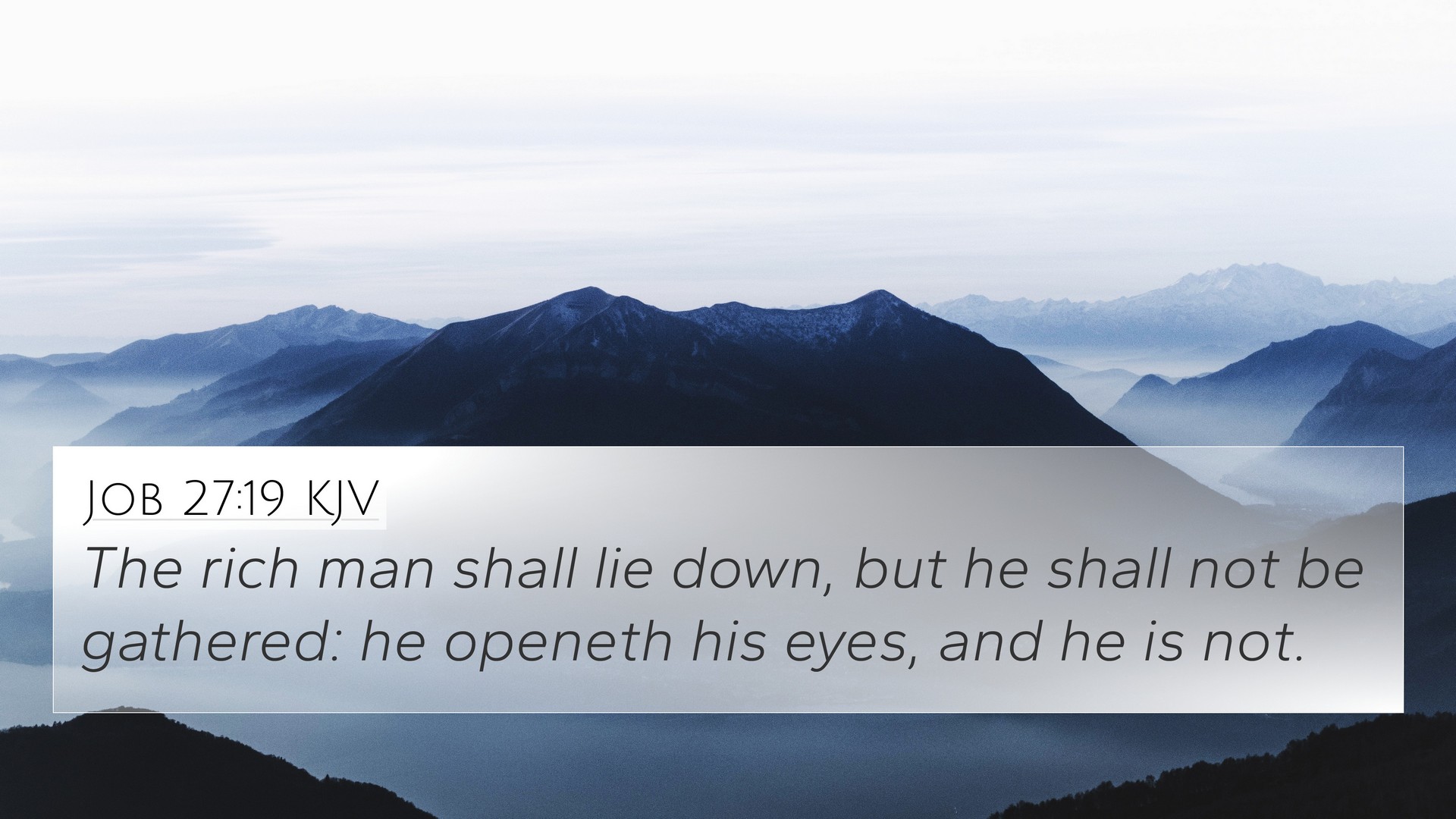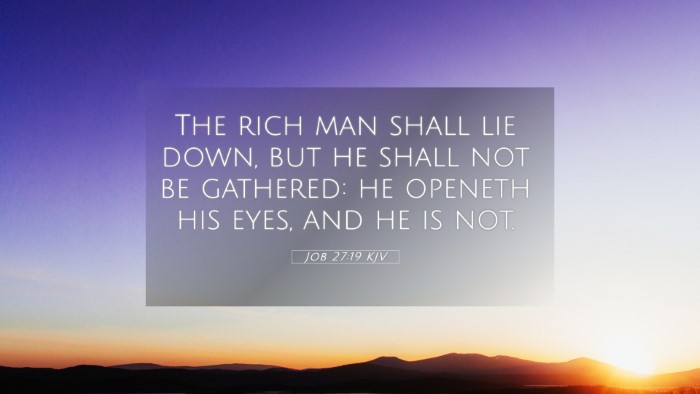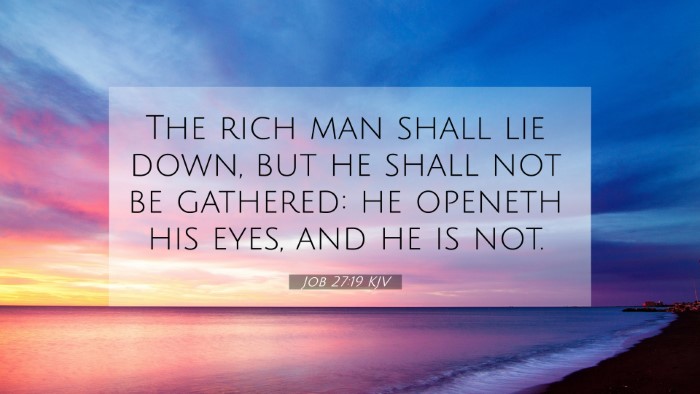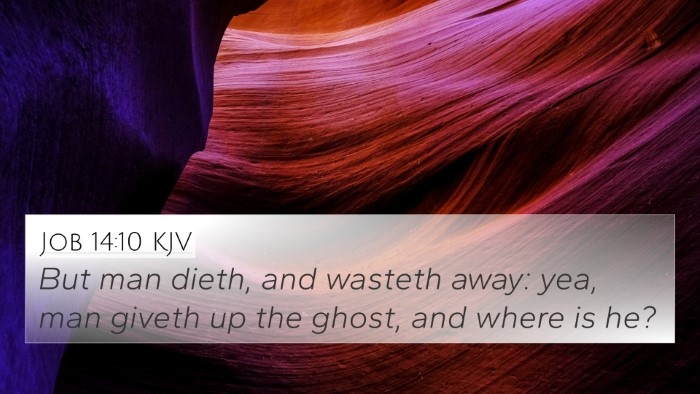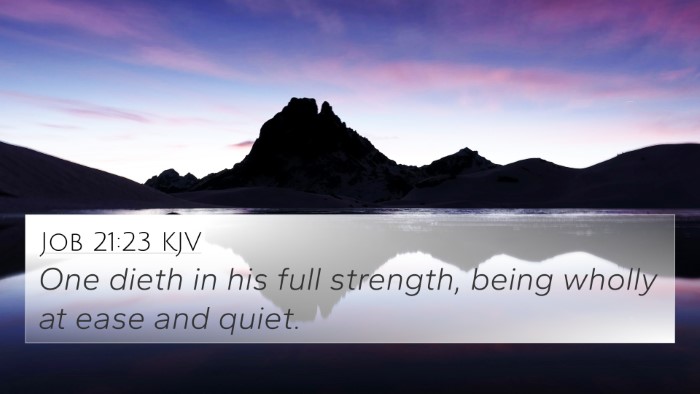Old Testament
Genesis Exodus Leviticus Numbers Deuteronomy Joshua Judges Ruth 1 Samuel 2 Samuel 1 Kings 2 Kings 1 Chronicles 2 Chronicles Ezra Nehemiah Esther Job Psalms Proverbs Ecclesiastes Song of Solomon Isaiah Jeremiah Lamentations Ezekiel Daniel Hosea Joel Amos Obadiah Jonah Micah Nahum Habakkuk Zephaniah Haggai Zechariah MalachiJob 27:19 Similar Verses
Job 27:19 Cross References
The rich man shall lie down, but he shall not be gathered: he openeth his eyes, and he is not.
Uncover the Rich Themes and Topics of This Bible Verse
Listed below are the Bible themes associated with Job 27:19. We invite you to explore each theme to gain deeper insights into the Scriptures.
Job 27:19 Cross Reference Verses
This section features a detailed cross-reference designed to enrich your understanding of the Scriptures. Below, you will find carefully selected verses that echo the themes and teachings related to Job 27:19 KJV. Click on any image to explore detailed analyses of related Bible verses and uncover deeper theological insights.
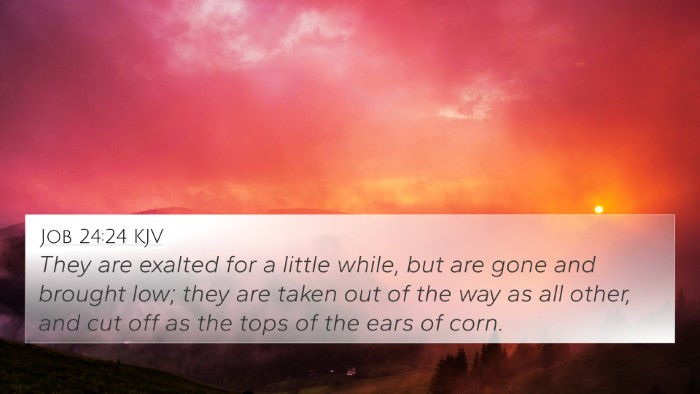
Job 24:24 (KJV) »
They are exalted for a little while, but are gone and brought low; they are taken out of the way as all other, and cut off as the tops of the ears of corn.
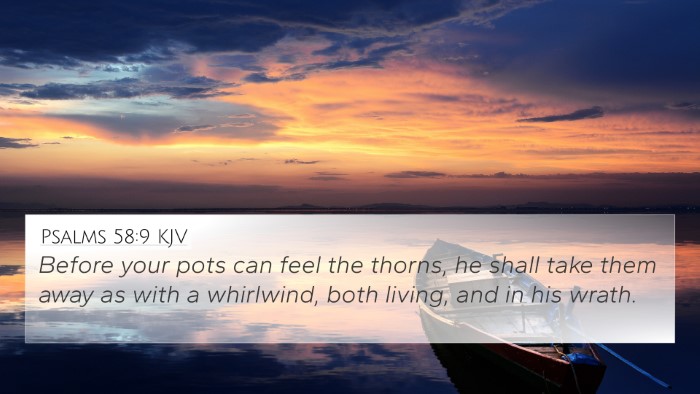
Psalms 58:9 (KJV) »
Before your pots can feel the thorns, he shall take them away as with a whirlwind, both living, and in his wrath.
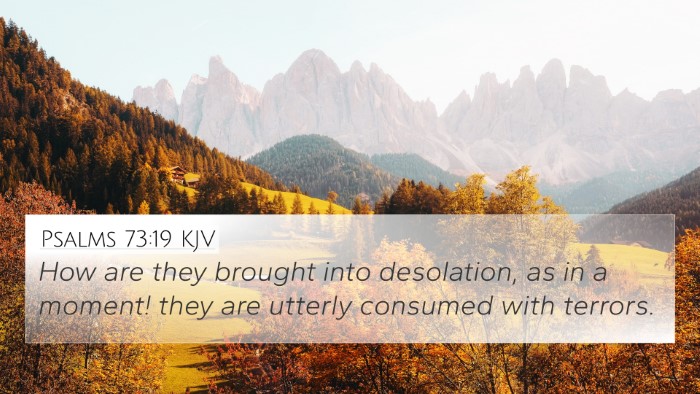
Psalms 73:19 (KJV) »
How are they brought into desolation, as in a moment! they are utterly consumed with terrors.
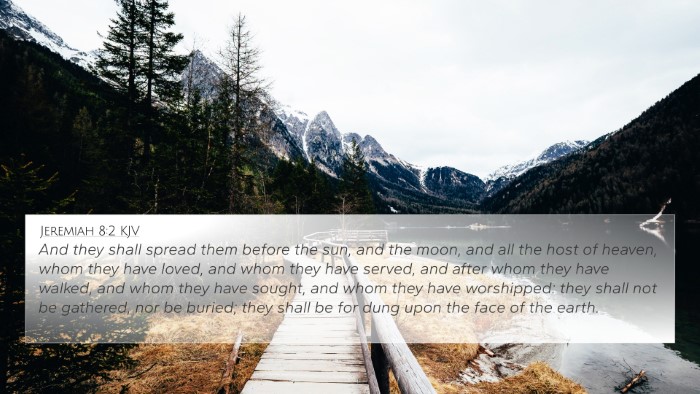
Jeremiah 8:2 (KJV) »
And they shall spread them before the sun, and the moon, and all the host of heaven, whom they have loved, and whom they have served, and after whom they have walked, and whom they have sought, and whom they have worshipped: they shall not be gathered, nor be buried; they shall be for dung upon the face of the earth.
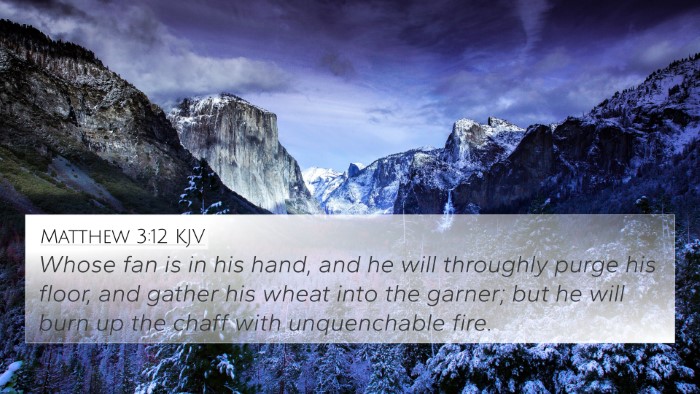
Matthew 3:12 (KJV) »
Whose fan is in his hand, and he will throughly purge his floor, and gather his wheat into the garner; but he will burn up the chaff with unquenchable fire.

Job 30:23 (KJV) »
For I know that thou wilt bring me to death, and to the house appointed for all living.
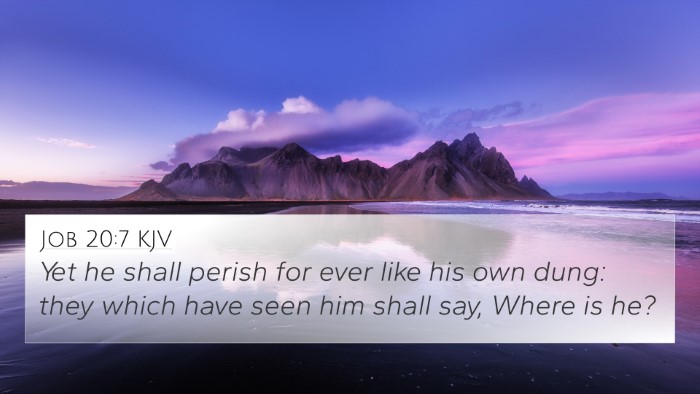
Job 20:7 (KJV) »
Yet he shall perish for ever like his own dung: they which have seen him shall say, Where is he?
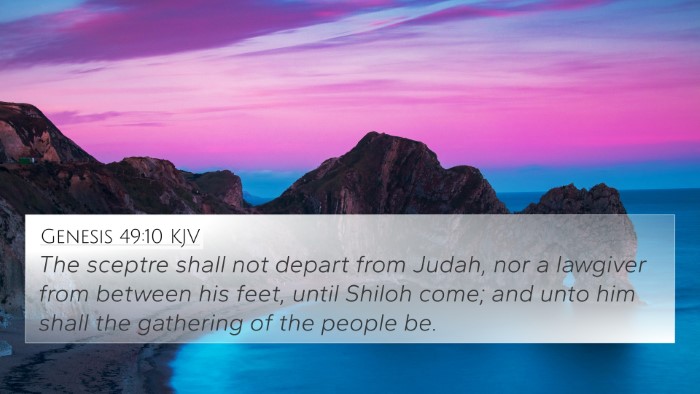
Genesis 49:10 (KJV) »
The sceptre shall not depart from Judah, nor a lawgiver from between his feet, until Shiloh come; and unto him shall the gathering of the people be.
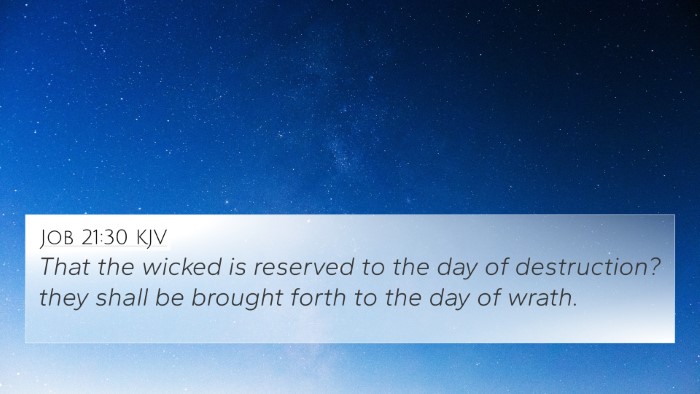
Job 21:30 (KJV) »
That the wicked is reserved to the day of destruction? they shall be brought forth to the day of wrath.
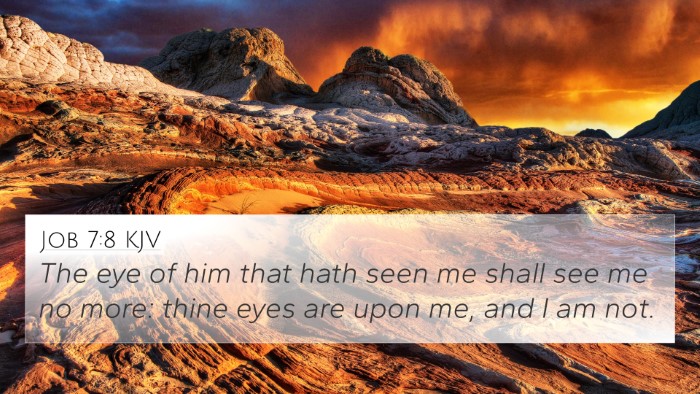
Job 7:8 (KJV) »
The eye of him that hath seen me shall see me no more: thine eyes are upon me, and I am not.
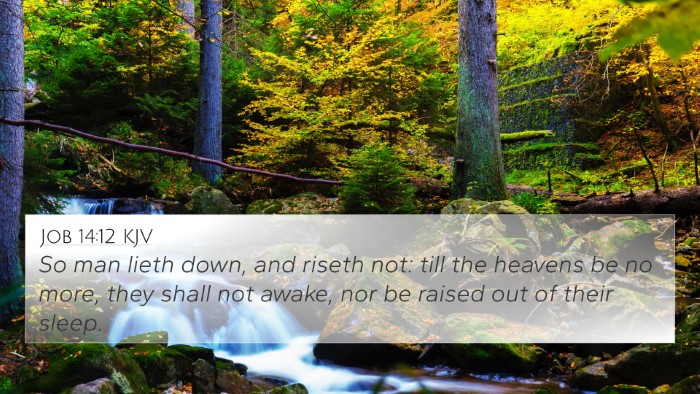
Job 14:12 (KJV) »
So man lieth down, and riseth not: till the heavens be no more, they shall not awake, nor be raised out of their sleep.
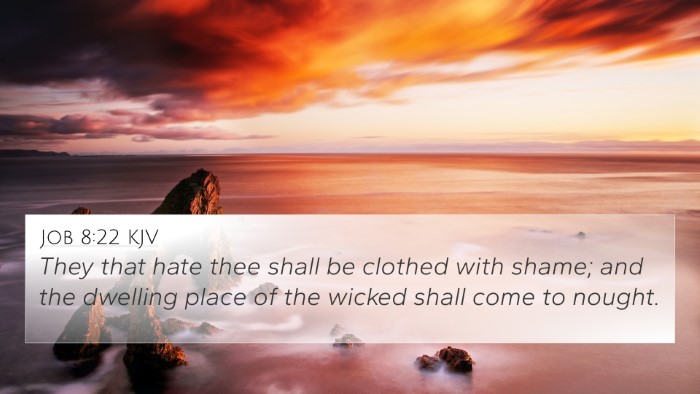
Job 8:22 (KJV) »
They that hate thee shall be clothed with shame; and the dwelling place of the wicked shall come to nought.
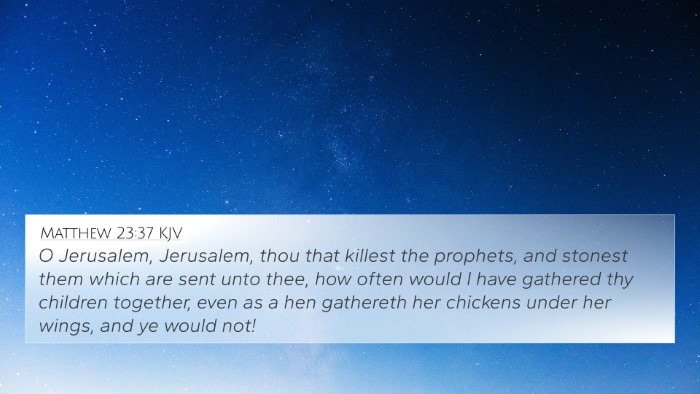
Matthew 23:37 (KJV) »
O Jerusalem, Jerusalem, thou that killest the prophets, and stonest them which are sent unto thee, how often would I have gathered thy children together, even as a hen gathereth her chickens under her wings, and ye would not!
Job 27:19 Verse Analysis and Similar Verses
Understanding Job 27:19 - A Comprehensive Analysis
Bible Verse: Job 27:19
Job 27:19 states: "He dies in his full strength, being wholly at ease and quiet." This verse encompasses the contemplation of death, the nature of a man's life, and the divine justice that underpins the human experience.
Contextual Overview
This verse is part of a larger discourse in the Book of Job, where Job addresses his friends who have accused him of wrongdoing. Here, Job asserts his integrity and implies a broader theme of questioning the relationship between righteousness, suffering, and the ultimate fate of the wicked and the just.
Summarized Insights from Public Domain Commentaries
-
Matthew Henry Commentary:
Henry emphasizes that Job's statement about dying in strength highlights the apparent prosperity of the wicked while they continue unrepentantly. He points out the irony of the situation, where the upright suffer while the wicked seem to flourish.
-
Albert Barnes Notes:
Barnes points out the tranquility of a wicked man's death despite his flawed life. The verse serves as a stark reminder of the distinction between outward appearances and spiritual realities. He reflects on the peace that comes to those who live without fear of retribution from God.
-
Adam Clarke Commentary:
Clarke remarks on the philosophical implications of death in this context, suggesting that death does not always come as a dire penalty for sinners. He stresses the need to understand divine justice not through immediate circumstances but through a larger lens of faith and divine providence.
Thematic Connections in Scripture
This verse can be linked thematically to several other biblical passages that discuss the fate of the righteous versus the wicked:
- Psalm 73:3-5: Reflects on the apparent success of the wicked, which causes the psalmist's struggle with understanding divine justice.
- Proverbs 14:32: States that the wicked is driven away in his wickedness, while the righteous have hope in his death, providing a contrast to Job's assertions.
- Romans 6:23: "For the wages of sin is death, but the gift of God is eternal life," addressing the ultimate consequence of a life lived outside of God’s will.
- James 5:20: Discusses turning a sinner from the error of his ways, illustrating the potential for redemption which contrasts with Job's observations.
- Luke 16:19-31: The parable of the rich man and Lazarus offers deep insight into the afterlife conditions for the wicked versus the righteous.
- Ecclesiastes 7:15: Suggests a similar theme where a just man perishes in his righteousness, and the wicked lives long in his wickedness.
- Malachi 3:15: Questions the value of serving God when it appears the wicked prosper, which echoes Job's arguments.
Comparative Bible Verse Analysis
This verse is crucial for understanding the broader biblical narrative regarding life, death, and divine justice.
- Job 24:23-24: Addresses the seeming assurance of the wicked in life, contrasting it with their ultimate fate.
- Psalm 1:4-6: Emphasizes the fleeting nature of the wicked and the stability of the righteous, forming a suitable parallel.
Bible Study Techniques for Understanding Cross-References
To delve deeper into the thematic connections and interpretations of Job 27:19, here are some tools and methods for Bible cross-referencing:
- Bible concordances: Use a comprehensive concordance to locate verses related to key themes and words.
- Bible cross-reference guides: Reference specific guides designed for thematic studies across the Scriptures.
- Scripture mapping: Create a visual representation of related verses and themes, enhancing understanding through spatial organization.
Conclusion
Job 27:19 encapsulates a critical exploration of life, death, and divine justice. The verse’s poignant message, coupled with cross-references throughout Scripture, invites further reflection on the themes of righteousness amid apparent inequity. Engaging with the biblical text through thematic analysis deepens our appreciation for its intricate design and God's overarching plan for humanity.
